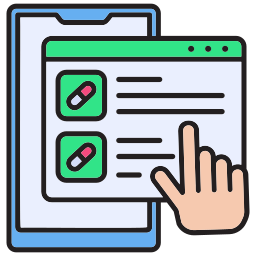In healthcare, permissions and functionalities within EHR systems are critical as they directly impact how healthcare teams access, manage, and share patient information. Permissions control who can view or edit specific data, while functionalities define what users can do within the system, such as scheduling, data entry, or analytics. For healthcare providers, these elements ensure that sensitive patient information is secure and that workflows remain efficient. A well-defined permissions structure and functional flexibility are key to supporting care delivery and compliance with data protection regulations, which is vital in healthcare environments.
Understanding the distinct permissions and EHR capabilities in Epic EHR, Cerner EHR, AthenaHealth EHR, and Meditech EHR is important for healthcare providers, as each EHR platform offers unique strengths and limitations. Epic and Cerner systems currently have 50% of the market share. While Epic is known for its extensive interoperability and customizable workflows, Cerner often emphasizes user-friendliness and integration with other clinical tools. Athena is known for its cloud-based model and ease of use in outpatient settings, while Meditech is recognized for its structured, cost-effective solutions aimed at smaller hospitals.
Knowing these differences is essential for healthcare teams to select and optimize an EHR system that aligns with their operational needs, ensuring both effective patient care and streamlined internal processes.
Let's learn how Epic EHR, Cerner EHR, Athena EHR, and Meditech EHR differ in their EHR permissions and capabilities, impacting healthcare operations and data access.
1️⃣ How Permissions and Functionalities in EHRs?
EHR capabilities vary widely among systems like Epic EHR, Cerner EHR, Athena EHR, and Meditech EHR, especially in permissions and data access controls. Permissions in EHR platforms are vital for security, data privacy, and compliance, defining who can access patient information. Systems like Epic and Cerner offer customizable permissions, allowing administrators to assign specific access levels based on user roles, ensuring only authorized personnel handle sensitive data. This flexibility aligns with clinical workflows, supporting both privacy and operational efficiency.
Functionality differences across EHR platforms impact day-to-day healthcare operations. Epic and Cerner, for example, provide comprehensive workflow tools that enhance patient management, from appointment scheduling to visit documentation. Athena and Meditech meanwhile target different priorities, with Athena emphasizing billing and practice management features. Integration capabilities further distinguish these systems; Epic, for instance, is recognized for its strong compatibility with third-party applications, whereas other EHRs may offer more limited interoperability. Understanding these variations in functionality helps healthcare providers select an EHR that aligns best with their specific needs.
Related Read: Cerner vs Epic: Choosing the Best Healthcare Solution for Your Business

2️⃣ Epic EHR: Permissions and Functionalities
Epic’s EHR capabilities provide a structured approach to data access through role-based permissions, allowing healthcare teams to assign access based on job functions. This method boosts privacy by restricting sensitive data access and includes configurable limits for external sharing, aligning with regulations.
Epic offers a robust patient engagement suite, enabling patients to view health records, manage appointments, and communicate with providers securely. Its data visualization tools simplify information interpretation for clinicians, and strong interoperability supports smooth data exchange across healthcare settings. However, organizations must navigate Epic’s complexity to ensure effective team adoption and usage.
Related Read: Epic EHR Integration Strategies: Best Practices & Tips
3️⃣ Cerner EHR: Permissions and Functionalities
Cerner’s EHR system offers a flexible approach to permissions, allowing healthcare organizations to set customizable user roles with specific access levels. This granular control supports secure data handling by enabling administrators to assign permissions based on job roles, ensuring users access the needed information. Cerner’s security includes audit trails to track user activities, support compliance, and spot unusual access patterns. In addition to these security layers, Cerner’s periodic security checks add an extra safeguard, helping healthcare organizations maintain a well-monitored digital environment.
Core functionalities within Cerner’s EHR focus on optimizing clinician workflows and supporting data-driven healthcare delivery. With population health management tools, Cerner helps clinicians identify and manage patient groups based on shared health needs, streamlining preventive care efforts. The platform encourages clinician collaboration through real-time data sharing and communication features.
Cerner’s mobile access enhances usability, keeping providers connected on-site or offsite. While its secure permission structure may add complexity, its adaptability and collaboration tools make it a solid choice for efficient, secure patient care.
Related Read: Cerner EMR: How HealthConnect CoPilot Simplifies Cerner Integration
4️⃣ Athenahealth EHR: Permissions and Functionalities
Athenahealth EHR designs its permissions framework to help small-to-midsized practices manage access effectively. Role-based assignments let users view or modify only the necessary information, protecting patient data. Its permissions model includes layers of access control, from clinical data to administrative functions, providing a clear way to monitor who accesses which records and actions. With a strong focus on data protection, Athenahealth EHR aligns with HIPAA requirements, making it a valuable choice for practices prioritizing patient confidentiality.
Athenahealth offers unique functionalities that cater to the needs of smaller practices. Its integrated telehealth capabilities support virtual consultations, which have become an essential service for many clinics. With built-in billing support, Athenahealth allows practices to handle payments directly through the EHR, which can help streamline workflows. These functionalities make Athenahealth a practical option for practices seeking an EHR with flexible access controls and features focused on efficient practice management.
Related Read: Telehealth in Home Health Care: Enhancing Patient Outcomes Through Innovative Solutions
5️⃣ Meditech EHR: Permissions and Functionalities
Meditech’s EHR system is designed with a structured permissions setup that supports department-specific access, allowing healthcare providers to grant or restrict information based on roles and responsibilities. This department-focused approach to permissions helps maintain patient privacy by limiting access to those who need specific data. With Meditech, administrators can assign user restrictions, ensuring sensitive information remains secure across departments. The platform facilitates secure data sharing between authorized users, promoting collaboration while protecting patient data within compliance standards.
Key functionalities in Meditech’s EHR include comprehensive patient records management, streamlined clinical documentation, and options for system customization. These capabilities allow healthcare organizations to organize patient data, ensure detailed record-keeping, and adapt certain system elements to align with their workflow needs. However, managing permissions in a large organization can pose challenges, especially as roles and access requirements evolve. Balancing data access with security often requires a careful setup, and Meditech's structured approach can require periodic updates to accommodate shifts in staffing and patient care demands.
6️⃣ Key Differences in Permissions: Epic vs. Cerner vs. Athenahealth vs. Meditech
When comparing EHR capabilities, understanding how each platform handles permissions is crucial. Each EHR system offers unique access controls, data-sharing options, and security protocols to manage sensitive healthcare information effectively. Here’s a breakdown of how Epic, Cerner, Athena, and Meditech differ in these key areas:
7️⃣ Choosing the Right EHR: Permissions and Functionalities in Perspective
When selecting an EHR, considering EHR capabilities like permissions and functionalities is essential for aligning with specific healthcare needs. Permissions affect how easily staff can access the required data while keeping sensitive information secure, which is critical for protecting patient privacy. Functionalities determine how effectively the EHR supports workflows, from appointment scheduling to medication tracking.
Evaluating each EHR capabilities strengths in permissions and functionalities can guide decision-makers in choosing the best fit for their practice size, specialty, and patient care goals. For example, large hospitals may benefit from Epic’s comprehensive permissions, while smaller clinics might find Athenahealth’s intuitive design better suited to their workflow needs.
How Healthconnect Copilot Can Help You Choose The Best EHR For Your Healthcare Business?
Understanding the differences in EHR capabilities and permissions between Epic, Cerner, Athena, and Meditech is crucial for selecting the right EHR platform. Each system offers unique ways to manage user access, patient data handling, and functionality directly impacts clinical workflows, data security, and patient care. Comparing their approaches helps healthcare organizations find an EHR that best aligns with their operational needs and compliance requirements.
HealthConnect CoPilot simplifies the EHR selection process by helping healthcare organizations navigate these EHR capabilities effectively. By evaluating permissions, data integration, and functionality within each platform, HealthConnect CoPilot guides you toward the best EHR choice that supports your clinical goals and operational priorities.
- What are the key differences in EHR capabilities between Epic, Cerner, AthenaHealth, and Meditech?
Each platform offers unique features. Epic excels in large healthcare systems with advanced interoperability. Cerner provides robust population health management tools. AthenaHealth focuses on cloud-based solutions for smaller practices, while Meditech is known for affordability and usability in community hospitals.
- How do permissions vary across Epic EHR, Cerner EHR, AthenaHealth EHR, and Meditech EHR?
Permissions depend on the platform’s architecture. Epic and Cerner allow granular user access control for larger organizations, while AthenaHealth and Meditech offer simplified access settings suited for smaller setups.
- Which EHR system offers the best customization for specific healthcare workflows?
Epic EHR is widely regarded for its flexibility in customization for diverse workflows. Cerner EHR is also adaptable but may require more technical support. AthenaHealth EHR and Meditech EHR focus on straightforward implementations with fewer customization options.
- How do these EHR platforms support interoperability?
Epic uses Care Everywhere for data exchange, Cerner relies on its CommonWell Health Alliance membership, AthenaHealth offers cloud-based connectivity, and Meditech supports data sharing through Expanse. Each has unique methods to facilitate interoperability across healthcare systems.

Pravin Uttarwar, CTO of Mindbowser
As the CTO of Mindbowser, a healthcare-focused software development company, I am dedicated to delivering cutting-edge digital solutions that transform patient care and operational efficiency. With over 16 years of experience and as an MIT alumnus, I specialize in healthcare interoperability, FHIR-compliant systems, and AI-powered platforms, crafting scalable products and architectures tailored to the unique needs of healthcare providers and enterprises.
I have spearheaded the development of over 100 products and platforms, guiding them from concept to full-fledged solutions. My expertise extends to scaling remote tech teams, driving EHR integrations, and building secure, cloud-native healthcare solutions. By shaping technology visions and roadmaps, I help clients achieve long-term growth and success in the rapidly evolving healthcare landscape.
HealthConnect CoPilot enabled us to access real-time patient health data through integration with Apple HealthKit, enhancing care delivery while maintaining HIPAA compliance. This led to personalized care and improved outcomes for patients.

AI-enhanced Obstetrics Clinical Decision Support Platform
HealthConnect CoPilot's integration with Epic's Hyperspace has transformed our workflow. Automated post-delivery examinations and HL7 protocol use ensure accurate updates to Epic. Their expertise empowers informed decision-making in childbirth

Top Provider for Customized Healthcare Solutions
HealthConnect CoPilot's helped us to integrate with leading tracking devices such as Apple Watches and Fitbit. This integration enables effortless syncing of health data, providing users with real-time insights displayed directly on our flagship products: smart mirrors and digital calendars.

A Provider of Customizable Display Solutions
Post a comment Cancel reply
Related Posts
Why Building Your Own EHR Integration Engine Is Smarter Than You Think?
Getting into the U.S. healthcare market means dealing with EHR integration early on. For SaMD…
From Bottlenecks to Breakthroughs: How Health Tech Teams Are Seizing Control of Their Data
If you’re immersed in the challenges of health tech innovation—scaling AI-native platforms, integrating with complex…
Ambulatory EHR vs Inpatient EHR: Which One is Right for Your Practice?
EHRs help doctors and healthcare staff store, access, and manage patient information digitally. They improve…
Ambulatory EHR: A Complete Guide for Healthcare Providers
Healthcare providers are moving beyond paper records and legacy systems, and ambulatory EHRs are leading…
Epic Integration with SMART on FHIR: A Complete Guide
The challenge of integrating AI-driven tools and third-party applications with Epic’s EHR system has long…
Epic EHR Integration – Unlocking Seamless Healthcare Connectivity
The EHR integration has revolutionized healthcare by enabling secure, real-time access to patient data. Epic…








